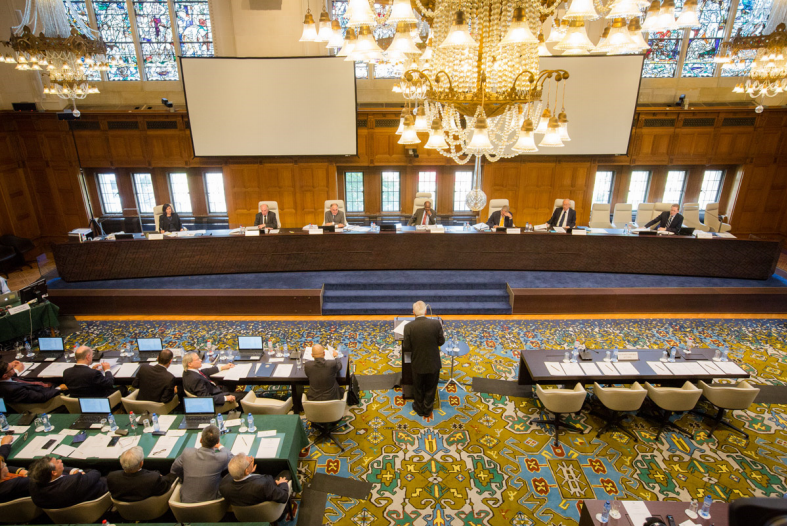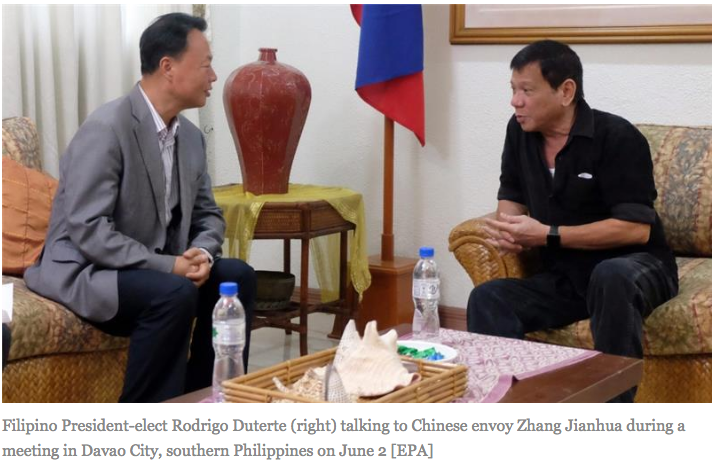Editor's Note
Arbitration Over, Time for China to Lead Responsibly
On July 12, 2016, the arbitral tribunal organized under the UN Convention on the Law of the Sea (UNCLOS ) Annex VII , and registered at the Permanent Court of Arbitration in The Hague, ruled on the complaint brought by the Philippines that China’s actions in the South China Sea had encroached on its maritime rights. The tribunal ruled largely in favor of Manila.
In a decision that was proclaimed “final and binding,” it concluded that China’s nine-dashed line claim had no basis in law or historical fact, and that the features occupied by China and Taiwan were not legally “islands” and are therefore not entitled to large maritime zones of their own. This ruling significantly reduces the area under dispute to small features and narrow belts of water immediately surrounding those features.

PCA Case Nº 2013-19: South China Sea Arbitration Award
Description:
Click here for the copy of the Award.
PCA Press Release on the Award of the South China Sea Arbitration
-
Description:
- Please see the attached press release by the Permanent Court of Arbitration (PCA) in the South China Sea Arbitration (The Republic of the Philippines v. the People’s Republic of China) concerning the Award issued by the Tribunal.
Resources from UP IMLOS on the South China Sea Arbitration
The UP Institute for Maritime Affairs and Law of the Sea (IMLOS) released its case digest and summary of findings on The Republic of the Philippines vs. The People’s Republic of China, Case No. 2013-19 in the Permanent Court of Arbitration before the Arbitral Tribunal constituted under UNCLOS Annex VII awarded last 12 July 2016. Also attached are the IMLOS compiled statements from foreign countries to the South China Sea Dispute regarding the arbitration award.
China Adheres to the Position of Settling Through Negotiation the Relevant Disputes Between China and the Philippines in the South China Sea
-
Description:
- The State Council Information Office of the People's Republic of China on Wednesday published a white paper titled "China Adheres to the Position of Settling Through Negotiation the Relevant Disputes Between China and the Philippines in the South China Sea". Following is the full text of the white paper.
FULL SPEECH: Duterte’s 1st State of the Nation Address
-
Description:
- ALMOST a month after taking office, President Rodrigo Duterte on Monday delivered his first State of the Nation Address (Sona) at the Batasang Pambansa in Quezon City. Duterte’s speech, which started at around 4 p.m., ran for 1 hour and 33 minutes. The speech touched on the government’s relentless war on drugs. It also tackled human rights, federalism, climate change and environmental matters, traffic and transportation issues, and peace talks with communist rebels, among others.
APPFI's Compilation of Statements by Countries Regarding the South China Sea Arbitration Award
Duterte and Arbitration Jitters
Recent international interest on the Philippines has spiked in the run up to the change in government as President Benigno Aquino III stepped down to give way to the new government of Rodrigo Duterte, as well as in anticipation of the announcement of a ruling by the arbitral panel hearing Philippine complaints against China’s actions in the South China Sea.
Why the Hague Ruling Matters
Interviewer: How does this ruling affect relations between China anad the Philippines?
Chito Sta Romana: It’s a challenge and an opportunity. A challenge because how to convert this legal document – the legal advantage – into reality. How to convince the Chinese to accept this and to abide by this ruling. But the opportunity is that we are facing the Chinese now with a new administration. The new administration has signalled a less adversarial, more concillatory approach to China – so, that may work in the Philippines’ favor. However, expect the Chinese right now to take a hard line. Expect a barrage of media, diplomatic… a lot of hot words in the coming few days as they take a defiant stand. This is a bit reminiscent of what happened in the Tiananmen Square, when the whole world practically was condemning China, and the Chinese took their position. Until eventually, there was an economic boom and the situation turned. So, I think we’l see more of that – the Chinese will pay a price to their image but it will create ripples in Chinese society that could eventually work in our favor.
Commentaries
The Philippines v. China verdict: China’s crossroads
Atty. Jay L. Batongbacal
‘An overwhelming victory’ is how Paul Reichler, lead counsel of the Philippines, describes the Award issued by Permanent Court of Arbitration Tribunal in the case of Philippines v. China concerning the South China Sea (SCS). The Tribunal unanimously granted all but a handful of Manila’s claims, and in doing so laid down a significant number of rulings that will reshape the discourse over the SCS disputes in the years to come.
Post-Arbitration Talks May Hold Key To Regional Stability
Lucio Blanco Pitlo III
Dialogue between Philippines and China may hold the key to soothing tensions and promoting peace in a longstanding regional flashpoint. Emotions ran high after the Hague-based Permanent Court of Arbitration (PCA) rendered a historic decision ending a 3-year arbitration process marred by China’s non-participation and artificial island-building and US challenges to excessive Chinese claims through freedom of navigation operations. The Award was considered a milestone in reiterating that pre-existing rights or historical claims are already superseded by UNCLOS and that features that do not qualify as true islands are ineligible for extensive maritime entitlements, save for a maximum12 nautical mile territorial sea for rocks. With a favorable ruling, there is much pressure on the Philippine government to use this legal and moral high ground to put to rest the decades-old dispute, but political realities make this difficult. There is also an emerging view that, despite the enormous resources invested in the legal track, dialogue may still hold the key to resolving the disputes.

Of Course China, Like All Great Powers, Will Ignore an International Legal Verdict
Graham Allison
This week the Permanent Court of Arbitration (PCA) will deliver its award in the Philippines’ case against China over maritime disputes in the South China Sea. In a bid to thwart Beijing’s attempt to turn the South China Sea into its own virtual lake, Manila contends that China’s claim to exclusive sovereignty over all the islands and shoals within the nine-dashed line – which encompasses 86 percent of the Sea – has no basis in international law. There is not much suspense about what the tribunal will decide: it will almost certainly side with the Philippines. The United States and its allies have already started criticizing China for signaling in advance that it will ignore the court’s ruling, which one Chinese official derided last week as “nothing more than a piece of paper.”
The great powers and the rule of law
Tommy Koh
In this reply to Professor Graham Allison, the writer argues that it is in the interest of both small states and great powers to abide by international law.
Professor Graham Allison is a brilliant scholar. He is currently the director of the Belfer Centre for Science and International Affairs at the Kennedy School of Harvard University. He had served previously as the dean of the Kennedy School. On July 16, this newspaper published an article by him entitled "Heresy to say great powers don't bow to international courts?"
China's South Sea Claims Were Always about Emotion, Not History
Bill Hayton
The South China Sea arbitration award is not just a victory for the Philippines over China; it is a victory for evidence over sentiment. I have spent the past five years digging through the competing versions of the region’s history. In the process, I have learned that China’s claims in the South China Sea were always more emotional than historical. They emerged from the sense of national violation during the nineteenth and early twentieth centuries, and mixed misunderstandings about history with poor translations of foreign maps and an unbending sense of self-righteousness.
What Now for China?
Zhao Daojiong
Synopsis
China has chosen not to take part in the arbitral tribunal brought against it by the Philippines. Hence, now that the tribunal has issued its ruling, China should stay away from commenting on the case and instead offer concrete plans for functional cooperation in the South China Sea.
Commentary
AFTER THREE years, the international arbitration that the Philippines brought against China on issues relating to the South China Sea dispute between them came to a formal end on 12 July 2016. The findings of the arbitral tribunal did not come as a surprise.
The Chinese government has rejected the tribunal’s finding, having exercised its right allowed in public international law not to participate in the tribunal. Chinese and/or non-Chinese citizens can take issue with the wisdom or the lack of it behind that decision. Regardless, a page has been established in history. Meanwhile, it is upon us to make use of moments of history.
West Philippine Sea Primer
The West Philippine Sea: The Territorial And Maritime Jurisdiction Disputes From A Filipino Perspective
"The purpose of this Primer is to make available in a single updated volume a simplified and objective rendering of the historical background, current conditions, pertinent issues and policy questions regarding the territorial and maritime disputes in the West Philippine Sea. It is intended to assist students, researchers, media practitioners, non-specialist members of the civil service, as well as the general public, in deepening their understanding of the many different issues of the West Philippine Sea disputes. The questions and answers are framed from a Filipino perspective that focuses on information that the authors considered to be most important and of interest to citizens of this country, rather than information that may be highlighted by various foreign authors, organizations or governments. The contents are not intended as advocacy of any particular position or policy recommendation."
